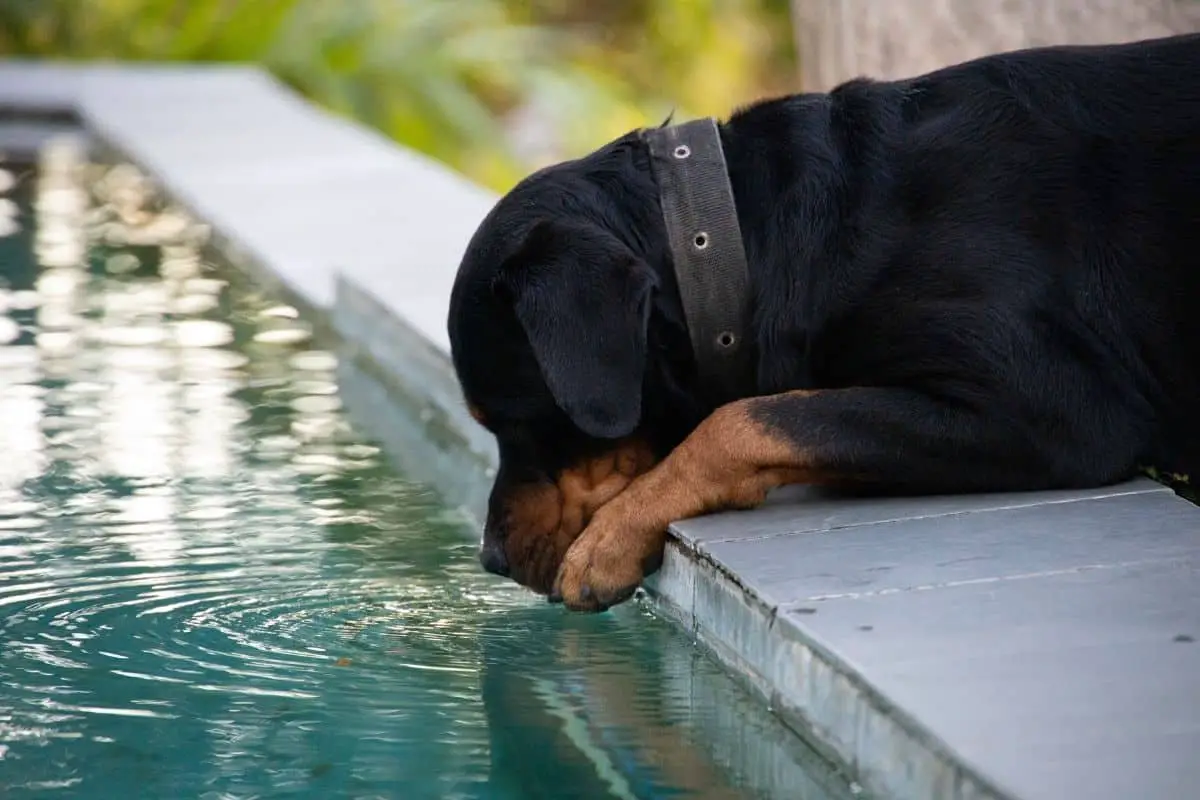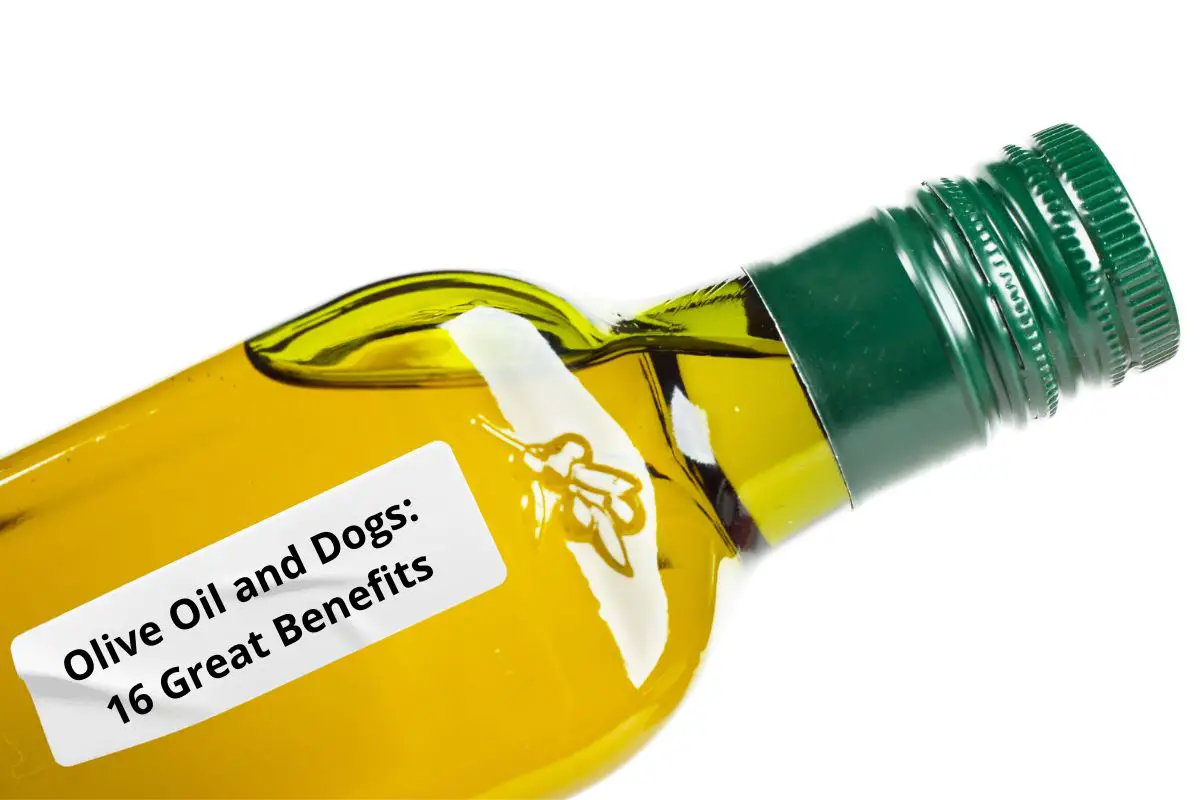This post contains affiliate links.
Dogs love swimming or being around the water just as much as us—especially during those hot summer months. However, they might get thirsty more often because of their thick fur coats and start drinking from the pool. So, what should you do if that happens?
If your dog drank pool water, monitor it closely for adverse effects. Small amounts of pool water shouldn’t cause immediate issues, but ingesting excessive salt and chlorinated pool water can cause an upset stomach or water intoxication. Consult with a vet if persisting vomiting or diarrhea occurs.
The rest of this article will discuss:
- The chemicals in pool water that can cause harm to dogs
- Water intoxication and how it impacts dogs
- Different symptoms to look out for and how to treat them
- When to call the vet
Table of Contents
Why Can’t Dogs Drink Pool Water?
Both chlorinated and saltwater pools can be harmful to dogs when ingested because of the chemicals and salt in the water. While some people may think a saltwater pool might be better for dogs, consuming too much salt can also cause poisoning.
Not only do you have to worry about the toxins, but a giant pool of water is also an unlimited supply compared to your dog’s usual bowl, so drinking too much water, in general, can cause water intoxication.
What Chemicals Are in Chlorinated Pools?
There are several chemicals in chlorinated pools. Chlorine and bromine are pool sanitizers, often called pool shock, so they kill off any bacteria and disinfect the pool to make it safe for people to swim in. There are several other chemicals present in pools along with chlorine:
- Alkaline: Alkalinity is important for pools. The stabilizers contain sodium bicarbonate and baking soda components.
- Cyanuric Acid: Cyanuric acid is a chlorine stabilizer; this chemical can be fatal if ingested in excessive amounts.
- Algaecides: Algaecides are necessary chemicals to kill algae in the pool.
While all of these chemicals are commonly seen in pools and are essential, ingesting them in excessive amounts isn’t advised. As you only put a small amount of each chemical in a large body of water, consuming some of the water is normal and won’t cause any harm.
What Chemicals Are in Saltwater Pools?
Saltwater pools contain many of the same chemicals as chlorine pools, such as alkaline and algaecides. However, some chemicals are less prominent in saltwater pools:
- Chlorine: Saltwater pools make natural chlorine, and the amount of chlorine is much lower than that of chlorinated pools.
- Salt: Too much salt can cause salt poisoning in dogs, which we’ll discuss in more detail later.
Do Dogs Have Symptoms After Drinking Pool Water?
While usually, your dog won’t have any problems after drinking pool water, it can cause issues if your dog drank too much or if there was a recent shock treatment on the pool. Therefore, many symptoms, some more serious than others, can occur.
Pool Water Chemicals Can Cause an Upset Stomach
Most of the time, if your dog has any symptoms, it will be an upset stomach. An upset stomach can encompass many things, like vomiting, diarrhea, or just stomach pain.
Vomiting
If you notice your dog is vomiting after drinking pool water, it’s because the chemicals in the water have upset its stomach. If vomiting lasts longer than two days, it could be something more serious.
The best way to treat vomiting due to drinking pool water is to watch your dog for any other severe symptoms and make sure it’s getting enough water. Vomiting without re-hydrating can cause your dog to experience dehydration, which can be fatal.
Diarrhea
Diarrhea will most likely accompany vomiting and should also only last a couple of days. Dogs typically experience diarrhea when they eat, or in this case drink, something that upsets their intestinal lining, so it’s a normal response and shouldn’t be too serious.
The best way to help your dog get through diarrhea is to withhold food for a bit or only feed your dog food that’s bland and easy to digest, such as boiled chicken and white rice. Like with vomiting, ensuring your dog gets an adequate amount of water is essential.
However, if you notice your dog is also feverish, lethargic, or there is blood present in its diarrhea, it’s something more severe and you should go to the vet right away.
Stomach Pain
Your dog also might experience abdominal pain, which might not be as easy to notice as vomiting or diarrhea. You might see your dog not wanting to eat, laying around, or if it’s gastric distress, you might hear loud gurgling sounds.
Stomach pains should pass quickly, but in the meantime, give your dog boiled chicken and white rice and offer plenty of fresh water. If the symptoms persist, however, you should contact your vet.
Too Much Pool Water Can Lead to Water Intoxication
Water intoxication is common in dogs who love to swim or are constantly around water. Even if the chemicals in the water are low, if your dog drinks too much, it can cause hyponatremia, which causes low sodium levels and can be fatal. Symptoms of water intoxication include:
- Difficulty breathing
- Seizures
- Lethargy
- Poor coordination
- Pale-colored gums
- Glazed eyes
- Excessive drooling
- Dilated pupils
Without proper treatment, water intoxication can be fatal to dogs. Your dog will need to be on an IV to regulate its electrolytes and reduce brain swelling.
Drinking Saltwater Can Prompt Saltwater Poisoning
Saltwater poisoning, similar to water intoxication, occurs when your dog drinks too much saltwater. So, if you have a saltwater pool and your dog ingested a lot of it, it’s essential to watch out for these symptoms:
- Vomiting
- Diarrhea
- Loss of coordination
- Seizures
- Excessive thirst
- Lack of appetite
- Lethargy
If you notice any of these symptoms after your dog drank saltwater, it’s crucial to get your dog to the vet, especially if it’s experiencing seizures, as this can cause brain swelling and potentially death.
Tips To Stop Your Dog From Drinking Pool Water
Even humans ingest a little pool water while swimming, as this is natural. Dogs, however, might swallow more than usual. There are many steps you can take to get your dog to stop drinking pool water in general.
Supply Fresh Water Outside
Always leave a bowl of fresh water near the pool. Doing so will allow your dog to drink from its bowl when it’s thirsty. However, your dog might need a little training to learn to drink from the bowl instead of the pool.
If you’re looking for a good water bowl for your dog, we recommend the SLSON Collapsible Dog Bowl from Amazon.com. This dog bowl is great for traveling, so whether you’re going to a friend’s house to swim in their pool or traveling to the beach, this dog bowl will be able to easily travel with you and give your dog something to drink out of.
Take Frequent Water Breaks
Taking frequent water breaks while swimming can help get your dog into the routine of drinking from its bowl. Intentionally leaving the pool and going over to the bowl to encourage your dog to get a drink is a great way to do so.
Offer Rewarding Treats
When your dog drinks from its water bowl outside instead of the pool, offer some treats as a reward. Soon enough, your dog will think of drinking from its bowl as a rewarding action. Therefore, the pool won’t be its primary choice of drink.
Discourage Your Dog For Drinking Pool Water
Every time you notice your dog is drinking pool water, give it a bit of a scolding and instead offer a water bowl. Doing this enough times will train your dog out of drinking from the pool.
When To Call the Vet
Knowing when to call the vet for your dog can be tricky. If you notice any illness with your dog, you might want to call the vet right away, even though it might not always be necessary. The majority of the time, your dog drinking from the pool will only cause a minor stomach upset.
However, if you notice severe signs such as vomiting and diarrhea for more than a couple of days, loss of coordination, or even seizures, you should call the vet right away.
Can I Let My Dog Swim?
Should you let your dog swim, always check your pool water’s alkalinity and pH balance beforehand. If you recently put a shock treatment in your pool, it’s best to keep your dog away until the chemicals are regulated.
You should only allow your dog in the water under supervision so you’ll know if it’s drinking any pool water and you’ll be able to stop it.
Final Thoughts
If your dog drank pool water, you probably have nothing to worry about. Unless you’re positive your dog drank an excessive amount of pool water, the main symptom it will likely experience is stomach issues, such as vomiting and diarrhea. It should clear up within a couple of days.
However, if you notice severe symptoms such as lack of coordination, lack of appetite, lethargy, or seizures, you should take your dog to the vet right away, as these can be examples of water intoxication or saltwater poisoning and can be fatal.
Related Articles
- Can Dogs Drink Sparkling Water? (Is It Safe?)
- What Can Dogs Drink Besides Water? (We Ask the Experts)
- Dog Water at Night – When To Cut Them Off
- Considering Forcing a Dog To Drink Water? (Read This First)
- Can a Dog Go 8 Hours Without Water?
- Can Dogs Drink Coconut Water? Let’s Find Out!
- Can Dogs Drink Distilled Water? Let’s Find Out
- How Long Can Dogs Go Without Water? (We Ask the Experts)
Sources
- Doggie Designer: My Dog Drank Pool Water! Here’s What to Do (Vet Answer)
- Dog Loves Best: How to Stop Dog from Drinking Pool Water?
- The Pet Wiki: Water Toxicity in Dogs
- WebMD: Summer Safety: Saltwater A Lethal Threat to Dogs
- VCA: Diarrhea in Dogs
- Hills Pet: Can Dogs Drink Pool Water?
- Wikipedia: Hyponatremia
Mrdogfood.com is a participant in the Amazon Services LLC Associates Program, an affiliate advertising program designed to provide a means for sites to earn advertising fees by advertising and linking to Amazon.com. We also participate in other affiliate programs which compensate us for referring traffic.





